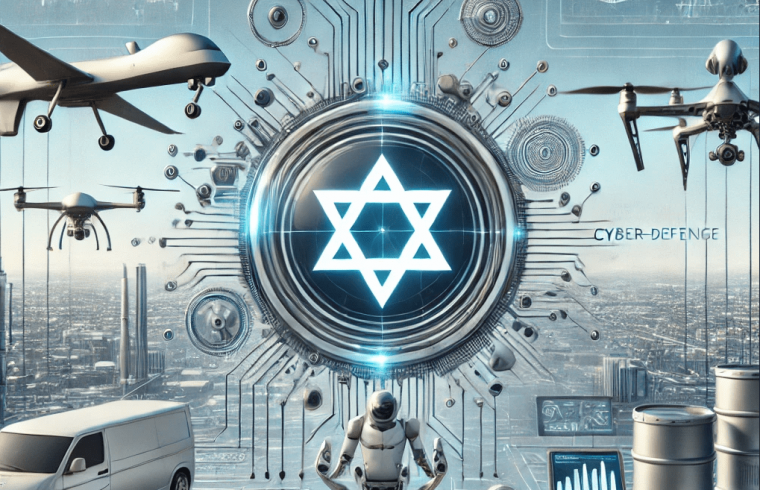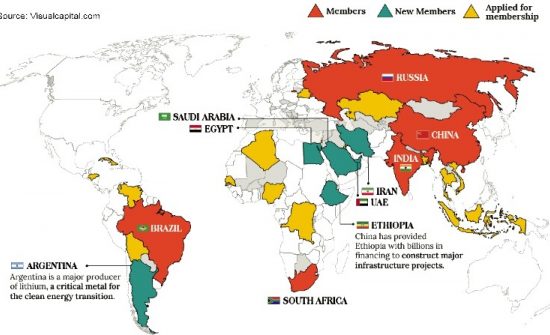By:
Artificial intelligence increasingly dominates the global emerging tech scene, seeping into virtually every sector and revolutionizing industry after industry. On a trajectory of immense growth, the global AI market size was estimated at 196.63 billion USD in 2023, up 60 billion USD from 2022. The market is expected to grow by over 13x throughout the next decade, showing exponential expansion driven by an arms race amongst the world’s biggest tech companies.[1]
Usage of AI tech is impacting healthcare, government, policing, banking, media, and more; changing or replacing jobs and turning industries upside down. The technology’s rapid expansion has raised red flags amongst some of the world’s top leaders, who warn a lack of guardrails and regulations dictating usage, development, and data privacy could lead to catastrophe- particularly in war. United Nations Secretary-General António Guterres warned of the dangers of such quick, intense progress during his address at the 2024 World Economic Forum’s Annual Meeting in Davos. Guterres spoke of the “existential threat” posed by “the runaway development of AI without guard rails” and the technology’s potential to worsen inequality. “The private sector is in the lead on AI expertise and resources,” he said during his January 2024 speech. “We need governments urgently to work with tech companies on risk management frameworks for current AI development; and monitoring and mitigating future harms.”[2]
While a small country, Israel has emerged as a regional and global leader in AI, ranking 7th in the world according to the Tortoise Global AI Index which measures based on implementation, innovation, and investment. It ranks second in intensity, meaning AI capacity relative to economy size and population.[3] Israel has a vibrant “hi-tech” scene, is known colloquially as the “Start-Up Nation,” has a heavy cultural emphasis on entrepreneurship, and has attracted millions of dollars in foreign investments in recent years. With thousands of tech start-ups and a heavy presence from some of AI’s heaviest international hitters (Microsoft, Google, and Nvidia to name a few), Israel’s highly unique culture, government initiatives, defense industry, and emphasis on international-facing companies have placed it as one of the leading countries in AI development and usage despite its size, political upheaval and current state of war.
The tech sector dominates Israel’s economy, contributing 18% to local GDP and employing 14% of all employees. Tech products and exports are responsible for around 50% of total exports.[4] Both the public and private sectors are rapidly moving to harness the power of AI across industries, as evidenced by the hundreds of start-ups popping up and several government agencies newly devoted to understanding, developing,g and utilizing the tech.
However, Israel is currently involved in a multi-front conflict that has damaged its economy and global reputation, limited high-tech innovation, and negatively impacted foreign investment- though the ongoing war has also pushed developments and rapid adoption of new AI technologies in the defense sector. In a period of immense instability, Israel is relying on its high-tech scene to work in conjunction with the government to rapidly develop relevant tech. As such, Israel’s AI development is mainly in the defense industry, with a strong sense of urgency pushing innovation. While there are still startups and several global giants with offices in Israel harnessing AI in other ways, the country’s current reality- a bloody conflict with no tangible end in sight that has left thousands of civilians dead and raised questions regarding the ethics behind AI in war, as well as a constantly looming threat from other Middle Eastern nations that could turn into full-scale war at seemingly any time – has turned much of the tech community’s focus on defense efforts.
According to a study from the non-profit independent think tank RISE Israel, global investments in Israel are not as strong as they are globally, thanks to a lack of human capital due to the war and a growing international sense of uncertainty in the unstable region’s present and future feasibility as a center of business and tech. In the first six months of the war, there was a 23% decline in foreign investment entities active in Israel compared to the six months prior. The decline in activity was even sharper during Israel’s judicial reform chaos in the late spring and early summer of 2023, down 30% compared to the previous six months. Relevant investment entities include venture capital firms, corporate venture capital funds (CVC), and institutional investors.[5]
How much can you tell about the role of AI in defense and intelligence?
Artificial intelligence is playing an increasingly large role in Israel’s defense plan, specifically in the Hamas War in Gaza. There are debates surrounding AI being used in war, as it improves existing capabilities, can be used as a strong detection device, and might improve the accuracy of decisions, but it also exists outside of international regulation with several moral and legal questions.
Being situated in a highly belligerent region with ever-shifting alliances and unstable peace, Israel is a military-focused country with a very high defense budget. There is a mandatory draft for all Israelis upon turning 18 into the Israeli Defense Force (IDF), meaning that the country’s workforce is comprised almost exclusively of former soldiers who received their training for whatever their chosen field is in the army. This applies to the high-tech sector, with many of Israel’s start-ups and well-established larger tech companies run by people trained in computers for military purposes during their IDF service. Furthermore, many Israelis have been called back to the army as part of IDF reserve duties (milium) over the last several months. The results are two-fold: some of the top leaders in AI technology are working on the battlefield, and Israel’s high-tech industry is lacking many of its workers. Thus, February 2024 saw Israeli tech funding down 60% from the same time in 2023 ($293 million vs $731 million).[6]
In terms of national attitude, Israel is a country with a strong sense of pride, combined with an ever-present feeling of existential threat. As such, many private sector companies work in conjunction with the government and IDF to bolster defense efforts with some of the most cutting-edge, advanced tech being developed- including AI. The Israeli government also allots a great deal of the budget to defense tech. After amending the 2024 budget in January amidst the ongoing Israel-Hamas War, Israel will spend 582 billion shekels, up some 70 billion from its initial budget, making up 6.6% of GDP this year.[7]
The IDF relies on AI to help with crisis control to mitigate disasters, similar to international organizations like NATO. AI technology is also used to bolster the Iron Dome, Israel’s missile defense system that keeps rockets and people safe in times of war, such as over the past several months.[8] AI was able to increase the Dome, a structure that helps block incoming missiles from hitting Israeli soil to over 90 percent success rate while also reducing operating costs.[9]
Over seven months into the war in Gaza, Israel has been publicly relying on AI to fight. A system called “Habsora,” or “The Gospel” in English uses machine learning to pinpoint potential attack targets in strikes, parsing large data sets to glean information at a rapid speed about buildings and structures from which enemies may be operating. An IDF spokesperson said in a public statement in February that while the Gospel is used to identify potential targets, the final decision to strike is always made by a human being and approved by at least one other person in the chain of command. The IDF also noted in November that in addition to increasing accuracy, the Gospel system “allows the use of automatic tools to produce targets at a fast pace.” The “Edge 360” system has also been deployed in Gaza. Developed by private Israeli AI defense company Axon Vision, the system is used on the battlefield to help vehicles identify and prevent attacks, parsing through massive amounts of data to aid with decision-making.
“The commander and crew don’t know what to do with all this data,” Roy Riftin, Axon Vision CEO, said in a March interview to Breaking Defense. “You need something to process it and make it relevant to operational time.”[10]
Another system from the private sector is the “Fire Weaver,” a tool created by Rafael, one of Israel’s three largest defense companies. This tool links weapons on the battlefield with intelligence-gathering sensors to help soldiers determine the best shooter for a shot- who is in the best location to take an accurate shot and how to identify targets.[11]
Artificial intelligence in defense is used to power decision support systems (DSS). These systems analyze extremely large datasets to help determine the amount of firepower needed, the best timelines, and the priority of targets. It helps to both determine targets and how capable a system is at attacking that target effectively- and then how to do so. Tasks that once took several weeks by analysts can now be done by AI systems in a matter of seconds
The IDF also relies on AI to improve its weaponry and monitor borders, though the system has come under the microscope after the October 7th attacks highlighted the weaknesses that can be taken advantage of when humans do not adequately supplement AI-led border patrol.
According to some researchers, AI capabilities have turned the ongoing war into one of the deadliest military campaigns in recent history by giving Israeli intelligence systems recommendations and key target identification. In an unverified report in April, researchers for 972mag described a system called “Lavender” that the IDF might use to identify targets for assassination in Gaza, gathering data to determine who is and is not affiliated with Hamas and the Palestinian Islamic Jihad.[12] There are moral questions surrounding how much to rely on AI systems in identifying human targets, as these systems are imperfect and often train themselves on biased data sets. However, it cannot be overlooked that AI in warfare is not a brand-new concept. AI has already existed in several forms across many of the world’s leading militaries. At least 30 countries use AI systems in their defense systems, according to Foreign Affairs, relying on the emerging tech to automatically sense attacks and intercept them- though humans supervise operations. Israel has also used AI in past conflicts and to enhance its intelligence capabilities, as well as maintains that all decisions go through human eyes before becoming a reality. Unit 3060, an IDF unit responsible for developing data systems for intelligence officers, was made public in 2018 after forming four years prior. Via machine learning and AI mechanisms, the unit stresses the gathering of big data so that its system can pull from a huge amount of information and create a more holistic image of the enemy and terrain.[13]
A June 2023 statement from Shin Bet, Israel’s counterpart of the FBI, revealed that the agency has its own generative AI platform and that the technology has been used to root out a “not-inconsequential number of threats.”[14]
Who are the main players? What is the state of public-private cooperation in Israel? Are there important processes or institutions?
Israel’s AI scene can be viewed through a dual lens, with the two parts being inextricably linked: private and public.
Private: The Israeli private sector is brimming with start-ups utilizing AI in a myriad of ways. According to RISE, there are around 2300 active AI companies in the country, making up about 25% of the total high-tech sector. Nearly half of all startups launched in 2023 were AI-related, as well as half of total investments in the sector.[15] As of September 2023, the number of generative AI startups in Israel more than doubled in just 5 months, with fundraising up 2.5 fold compared to April 2023, reaching $2.3 billion.
To boost the field and promote growth, Israeli venture capitalist firms have put a recent emphasis on pushing AI technology among portfolio companies and potential portfolio companies. In a national trend similar to the one playing out on the global stage, AI is integral in some shape or form in seemingly every new and many existing start-ups.
For example, Israeli VC fund OurCrowd announced in March 2024 that it would be collaborating with Nvidia to boost its new artificial intelligence fund started in September 2023, hoping to fast-track startups into Nvidia’s Inception Program. This program opens doors for start-ups by giving them Nvidia’s most cutting-edge tech and places them in alliance with one of the most valuable companies in the world. Other global companies with major AI footings in Israel include Amazon, Microsoft, and Google.
RISE Israel partnered with Google Israel to launch “AI Forward: Unlocking AI’s Potential for the Future of Israel,” a project focused on enhancing Israeli lives via AI. Goals include developing and putting in action policies that will help people and businesses. Google selected a handful of places around the world in which to establish research and academic centers aimed at shaping the AI future- Israel is one of those places. However, a research study from the partnership showed that Israeli AI investments are significantly lower than global numbers- an increase of 85% between 2020 to 2023, compared to 900% in the US and 300% in Europe.
“The AI revolution is inevitable, and Israel cannot afford not to be a leading country in this field,” said RISE Israel chairman Prof. Eugene Kandel in the report. “Besides keeping Israel competitive in the global race, adopting artificial intelligence can significantly improve the quality of life for Israeli citizens.”[16]
A global AI 100 List from CB Insights in 2022 had four Israeli firms listed: AI21 Labs, Pecan AI, Run: AI, and Zencity. Other large AI start-ups include Mobileye, Gong, and Papaya. Startups across Israel’s high-tech ecosystem are working on a variety of tasks within the AI sphere, including voice recognition and conversational AI, data analysis and computing, security tech, and more.
A key part of the private sector’s AI development is in the security industry. The high-tech security field is closely linked with the government in a kind of shared “dual feeding” process, with the defense companies listed earlier in this paper as key examples. The security industry gets funding and support; in return, the government has some of the country’s smartest and most well-funded minds working to maximize the defense possibilities inside this new tech.
Public
The Israeli government has taken a keen interest in AI technology at a key time in the country’s history, pushing different agencies to focus on how to best integrate the tech into their areas of expertise and utilizing AI mechanisms in warfare. First recognizing AI as a nationally prioritized field in 2020 and establishing a national policy for AI establishment in the same year, Israel has since made steps to push research and development, government strategy, and a positive operating environment for startups.
Israel’s National AI Program was launched in 2023 with a first installment of 517 million shekels, asking directors-general of different government ministries to find ways to use AI in their operations. This program is overseen by the Ministry of Innovation, Science and Technology, with the explicit aim to improve the public sector’s efficacy and enhance the lives of citizens. With the government’s focus and investment in AI, companies are racing to progress in their tech. The Program looks to tie in the National Digital Agency, the Israel Innovation Authority, the Finance Ministry, and the Justice Ministry, working across government bodies, sectors, and international borders to boost Israel’s development of tech. As part of the 2024 plan, the Program got 500 million more shekels to expand its goals.[17]
The government is investing directly in the private sector to achieve its goals, spurring innovation and growth. The AI market size is projected to reach $1.94 billion in 2024, with an anticipated annual growth rate of nearly 16% by 2030. [18]
What is the state of high-quality personnel given recent emigrations?
Over the past year, several issues across the country’s political and defense systems have caused issues in the sector’s growth and driven some of the best-educated workers and most promising countries to relocate outside the country.
A judicial overhaul during the summer of 2023 caused hysteria in the high-tech sector who feared changes in government policy would weaken Israel’s democracy and put the country’s international standing in jeopardy. According to an April 2023 poll, 80% of startups and 84% of investors thought the judicial system reform that gave more power to the government and weakened the Supreme Court’s powers to veto legislation would damage the high-tech sector.[19] In January of this year, the Court struck down key parts of the plan, though the long-term impact of the dramatic summer on the high-tech sector remains to be determined. Additionally, there has been a drain of talent to the IDF. Tech workers and leadership were called back at the onset of the Hamas war, with 16% of the sector joining over 350,000 other reservists.[20]
As such, the value of Israeli tech exits fell 56 percent in 2023, down to $7.5 billion from $16.9 billion the year before.[21] According to a PwC survey, deals also dropped 38%, and the average value was down 29%.
Prior to these problems, Israel had been focusing on attracting foreign talent to work in the high-tech sector and training those already in the country. A November 2022 initiative from the Israel Innovation Authority (IIA) aimed to train new immigrants for skilled jobs in the high-tech sector, relying on roughly $5.12 million in government funds for the new schemes.[22]
Israel has faced an issue with human capital for several years. Relative to the surge in demand for workers in STEM with advanced degrees, Israel does not have the number of people necessary. Over 60% of positions within the AI field demand advanced degrees, but less than 700 students graduate with a master’s degree in relevant fields each year and only 100 with doctoral degrees. A large chunk of these graduates in computer science then move abroad, lowering the number of relevant workers in the pool even more.[23]
Summary
As a global tech powerhouse known for start-ups, entrepreneurial energy, and government investment in emerging tech, Israel has a hearty AI scene. However, the industry has been heavily impacted by the ongoing war and regional hostilities, as tech turns more and more towards the security sector and foreign investments fall. While the rest of the world plows ahead with AI development, Israel might be slowly falling behind as it places resources and focuses more greatly on the defense sector at the cost of development and utilization elsewhere.
[1] https://www.grandviewresearch.com/industry-analysis/artificial-intelligence-ai-market
[2] https://www.weforum.org/agenda/2024/01/davos-2024-special-address-by-antonio-guterres-secretary-general-of-the-united-nations/
[3] https://www.tortoisemedia.com/2023/06/28/the-global-artificial-intelligence-index/
[4] https://www.timesofisrael.com/israeli-tech-exits-slump-56-in-2023-deal-flow-drops-to-lowest-level-in-a-decade/
[5]https://www.calcalistech.com/ctechnews/article/23al6hl9y#:~:text=The%20Israeli%20high%2Dtech%20sector,and%20startup%20companies%20depend%20on
[6] https://www.calcalistech.com/ctechnews/article/hyfgujz6t
[7] https://www.reuters.com/world/middle-east/israel-cabinet-passes-amended-budget-adding-15-billion-war-2024-01-15/
[8] http://opiniojuris.org/2024/04/20/artificial-intelligence-in-the-battlefield-a-perspective-from-israel/
[9] https://lieber.westpoint.edu/beyond-headlines-combat-deployment-military-ai-based-systems-idf/
[10] https://breakingdefense.com/2024/03/israels-axon-vision-ceo-talks-ai-in-ground-combat-in-gaza/
[11] http://opiniojuris.org/2024/04/20/artificial-intelligence-in-the-battlefield-a-perspective-from-israel/
[12] https://www.972mag.com/lavender-ai-israeli-army-gaza/
[13] https://en.globes.co.il/en/article-israeli-army-unveils-data-science-unit-1001218102#:~:text=Unit%203060%20is%20sometimes%20called,where%20a%20conflict%20takes%20place.
[14] https://www.reuters.com/technology/israels-shin-bet-spy-service-uses-generative-ai-thwart-threats-2023-06-27/
[15] https://innovationisrael.org.il/en/wp-content/uploads/sites/3/2023/07/2023-The-state-of-High-Tech.pdf
[16] https://rise-il.org/insight/israels-position-in-the-artificial-intelligence-race/
[17] https://www.gov.il/BlobFolder/news/most-news20231218/en/Israel%20National%20AI%20Program%202024.pdf
[18] https://www.trade.gov/market-intelligence/israel-artificial-intelligence-partnering-opportunities
[19] https://www.timesofisrael.com/80-of-israeli-startups-say-judicial-shakeup-will-have-negative-impact-survey/
[20] https://www.jns.org/israels-tech-sector-shows-resilience-despite-challenges-post-oct-7/
[21] https://www.pwc.com/il/en/exit_report_2023_final.pdf
[22] https://www.timesofisrael.com/israel-to-fund-training-schemes-to-lure-tech-talent-from-overseas/
[23]https://www.calcalistech.com/ctechnews/article/hjzkreqma#:~:text=In%20Israel%20today%2C%202%2C300%20companies,a%20third%20in%20previous%20years.










